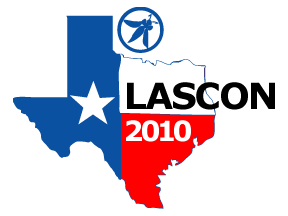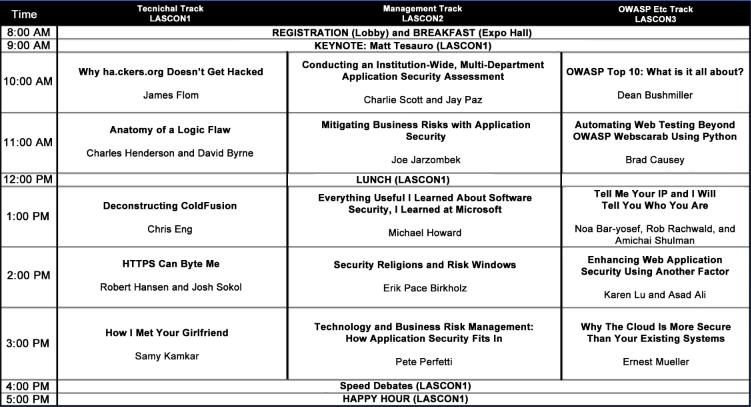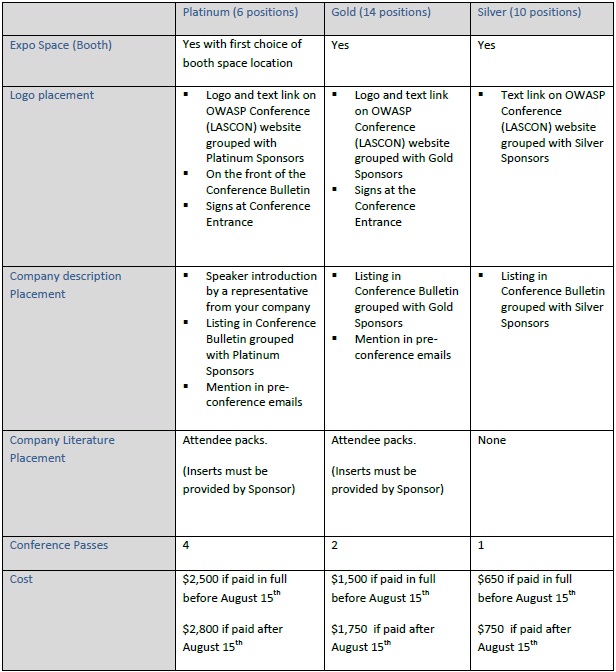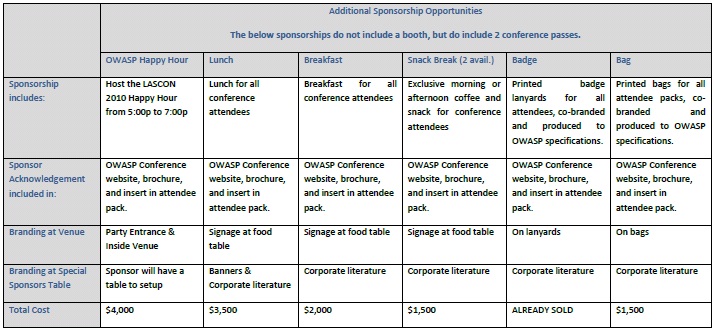This site is the archived OWASP Foundation Wiki and is no longer accepting Account Requests.
To view the new OWASP Foundation website, please visit https://owasp.org
Lonestar Application Security Conference 2011
Please see the Sessions tab for the Powerpoints and Videos from LASCON 2010.
SAVE THE DATE: LASCON 2011 is happening on October 28th, 2011 in Austin, TX
Registration Link | Speaker List Posted! | Follow LASCONATX on Twitter | Norris Conference Center
Welcome
|
|
|
Registration
Registration Is Now Open!
OWASP Membership ($50 annual membership fee) gets you a discount on registration.
| Non-Members (Includes a 1 year OWASP membership) | $150 Until 10/26/2010 | $200 After 10/26/2010 |
| OWASP Members | $100 Until 10/26/2010 | $200 After 10/26/2010 |
| Students with valid Student ID (must be shown at the door) | $80 Until 10/26/2010 | $2000 After 10/26/2010 |
Who Should Attend LASCON 2010:
- Application Developers
- Application Testers and Quality Assurance
- Application Project Management and Staff
- Chief Information Officers, Chief Information Security Officers, Chief Technology Officers, Deputies, Associates and Staff
- Chief Financial Officers, Auditors, and Staff Responsible for IT Security Oversight and Compliance
- Security Managers and Staff
- Executives, Managers, and Staff Responsible for IT Security Governance
- IT Professionals Interesting in Improving IT Security
For student discount, you must present proof of current enrollment when picking up your badge. No exceptions.
Sessions
Keynote
Matt Tesauro
Keynote
Video: Link
Technical Track
James Flom
Why ha.ckers.org Doesn’t Get Hacked
Ha.ckers.org has suffered nearly every attack a website can. These attacks include robots, sophisticated web-based attacks, brute force, denial of service, and network based attacks. This speech will explain the other side of protecting high risk websites - the configurations, operating system, and network.
Charles Henderson and Garrett Held
Anatomy of a Logic Flaw
Traditional vulnerabilities like SQL Injection, buffer overflows, etc, have well established techniques for discovery and prevention. On the other hand, logic flaws are incredibly diverse and often unique to the specific application or business organization. Because of this, logic flaws have taken on a near mythical status. In the myth, logic flaws are nearly impossible to find until the elite of the elite hackers launch an attack to completely own the application. The reality is far different; logic flaws are not the complex nightmare that many have made them out to be. This presentation will use real-world examples to show how logic flaws are typically introduced into an application, how they can be consistently detected during testing, and how they can be prevented during development. Instead of hoping for magic, repeatable processes will be outlined for each of those items. This will prove beneficial to anyone responsible for application security: programmers, architects, managers, and pen testers.
Chris Eng
Deconstructing ColdFusion
ColdFusion is a somewhat forgotten but still very prevalent web application development platform. This presentation is a technical survey of ColdFusion security that will be of interest mostly to code auditors, penetration testers, and developers. In the talk, we'll cover the history of the ColdFusion platform and its relevance to today's security landscape. We'll describe basics of ColdFusion markup, control flow, functions, and components and demonstrate how to identify common web application vulnerabilities in the source code. We'll also delve into ColdFusion J2EE internals, showing what CFML pages and components look like when compiled down to Java, and describing some of the unusual behavior we've observed at that level. We'll discuss open-source tools to aid reverse engineers in working with ColdFusion's proprietary classfile format.
Robert Hansen and Josh Sokol
HTTPS Can Byte Me
Video: Link
HTTPS was created to protect confidentiality and prove integrity of content passed over the web. It has essentially become the de-facto standard for internet commerce transport security. Over the years a number of exploits have attacked the principle, underlying PKI infrastructure and overall design of HTTPS. This presentation will drive another nail in the HTTPS coffin through a number of new exploitation techniques leveraging man-in-the-middle attacks; the goal of which is to break confidentiality and integrity of HTTPS traffic. The impact of these flaws suggests a need for changes in the ways we protect the transmission of data online.
Samy Kamkar
How I Met Your Girlfriend
Video: Link
How I Met Your Girlfriend: The discovery and execution of entirely new classes of attacks executed from the Web in order to meet your girlfriend. This includes newly discovered attacks inclduing HTML5 client-side XSS (without XSS hitting the server!), PHP session hijacking and weak random numbers (accurately guessing PHP session cookies), browser protocol confusion (turning a browser into an SMTP server), firewall and NAT penetration via Javascript (turning your router against you), remote iPhone Google Maps hijacking (iPhone penetration combined with HTTP man-in-the-middle), extracting extremely accurate geolocation information from a Web browser (not using IP geolocation), and more.
Management Track
Charlie Scott and Jay Paz
Conducting an Instiution-Wide, Multi-Department Application Security Assessment
From early 2009 until mid-2010, the Information Security Office at the University of Texas at Austin conducted a security assessment of over 250 web applications, spanning over 30 departments. The objectives of this assessment were to provide a thorough security review of existing applications, and act as an education and awareness exercise for the application developers. This presentation covers the political, technical, and scheduling challenges encountered on this assessment, how they were overcome, the results of the assessment and the changes they brought about, and lessons learned by the assessment team.
Joe Jarzombek
Mitigating Business Risks with Application Security
Video: Link
With today’s global IT software supply chain, project management and software/systems engineering processes must explicitly address security risks posed by exploitable software. Traditionally, these disciplines have not clearly and directly focused on software security risks that can be passed from projects to the organization. Software security assurance processes and practices span development and acquisition and can be used to enhance project management and quality assurance activities. Mr. Jarzombek explains the critical need for adherence to the practices, guidelines, rules, and principles used to build security into every phase of software development.
Michael Howard
Everything useful I learned about software security, I learned at Microsoft!
Video: Link
In this talk, Michael will discuss some of the things he has learned over the last 10 years working on software security at Microsoft. The Wins. The Losses, but most importantly, the Wisdom learned!
Erik Pace Birkholz
Security Religions and Risk Windows
There is a difference between what is possible and what is probable, something we often lose sight of in the world of information security. For example, a vulnerability represents a possible way for an attacker to exploit an asset, but remember not all vulnerabilities are created equal. Obviously, we must also keep in mind that a vulnerability's mere existence does not necessarily mean it will be exploited, or indicate by whom or to what extent. Some vulnerabilities are more difficult to exploit than others and therefore attract different attackers. Autonomous worms & viruses may attack one type of issue, while a sentient targeted attacker may prefer another path. Better understanding of these factors enables us to make informed business decisions about website risk management and what is probable.
Pete Perfetti
Technology and Business Risk Management: How Application Security Fits In
This presentation demonstrates how important application security is to the overall stability and security of the infrastructure and the ultimately, the business. Presented from the Information Security Officer/Risk Manager point of view, it shows how a strong information security program reduces levels of reputational, operational, legal, and strategic risk by limiting vulnerabilities, increasing stability, and maintaining customer confidence and trust. It focuses on the top concerns of risk managers and how application security fits into the overall risk management process. The audience will be given recommendations on how to improve cost effectiveness and efficiency to achieve business, security, audit, and compliance objectives relative to applications.
OWASP Etc Track
Dean Bushmiller
OWASP Top 10: What is it all about?
Everyone knows exactly what the OWASP top ten security threats are, right? Well sort of... I ask people if they have heard of the top ten they say yes. I ask them to name a few they pause, then they blurt out 2-3. Then I ask them to explain those 2-3 and they look at me like a deer-in-the-headlights. I want to make sure that everyone who walks out of the presentation can clearly define the top ten and be able to communicate to another what each of the top ten vulnerabilites are.
Brad Causey
Automating Web Testing Beyond OWASP Webscarab Using Python (Python Files)
This presentation will illustrate ways to improve web security assessments by using advanced features in OWASP Webscarab and extending your options with automation using Python.
Noa Bar-yosef
Tell Me Your IP and I Will Tell You Who You Are
IP addresses have been traditionally considered an unreliable method for attack detection. The unreliability is attributed to the use of web proxies, NAT and non-static IP addresses for end-stations. This session will demonstrate how information derived from IP addresses can in fact be used to dramatically improve attack detection capabilities. The presentation will discuss attributes such as Geo Location, Reverse DNS Lookup, Anonymous Proxy lists and more. We discuss how IP intelligence can be used to increase detection effectiveness (ratio of false positives to false negatives) by "ruling" on otherwise indecisive anomalies. We also discuss certain scenarios in which IP intelligence is crucial for even detecting anomalies. The presentation is supported by corroborative evidence derived from actual log data and demonstrates some of the tools that can be used for analysis.
Karen Lu and Asad Ali
Enhancing Web Application Security Using another Factor
As web applications have become a necessity of contemporary societies, there is an increasing need to secure access to these applications. This talk explains how web applications can add the "what-you-have" factor to strengthen user authentication and enhance the security, without compromising the ease of use generally associated with the traditional username/password method. In particular, we will describe smart card based authentication methods, including OTP, TLS mutual authentication, and X.509 certificate-based challenge/response. Although these methods have their strengths and weaknesses in terms ofsecurity and usability, they all significantly enhance the authentication for web applications.
Ernest Mueller
Why The Cloud Is More Secure Than Your Existing Systems
Security is frequently cited as the #1 hindrance to the adoption of cloud computing. Much of this concern is generated by the fact that security is frequently cited as the #1 hindrance to the adoption of cloud computing. Come cut through the FUD and hear about ways in that cloud systems are actually way more secure than what you already have running in your enterprise, and how you as a security professional can benefit from the cloud when creating secure systems.
Speakers
Asad Ali is a senior researcher at Gemalto Technology & Innovation group and is currently working on next-generation smart card products. His research interests include smart card operating systems, application frameworks, security protocols, embedded file systems, smart card usability, and secure portable tokens. He is co-inventor of the xID architecture for plug-n-play smart cards, and the Network Card technology that won Card Technology 2005 "Breakthrough Award for Innovation." He holds several patents in the field of Smart Card connectivity and their ubiquitous use, and has published extensively on these topics. Mr. Ali has a Master's degree in Engineering from MIT.
Noa Bar-Yosef is a Senior Security Strategist at Imperva. Previously, she held the position of a senior security researcher with the Imperva Application Defense Center. She conducted research on database and Web application vulnerabilities. Prior to Imperva, she has held TA positions in courses on programming and network security at Tel Aviv University and Open University. She has also been a software engineer with educational software vendor Sunburst Technology. Bar-Yosef holds a MSc degree (specializing in information security) from Tel-Aviv University, School of Computer Science and a BSc degree from The Hebrew University, School of Computer Science. During her work in Imperva, Noa has discovered multiple vulnerabilities in various commercial applications and worked with software vendors on their resolutions.
Erik Pace Birkholz, CISSP is the author of the best-selling book SPECIAL OPS: Host and Network Security and a contributing author of five international best-selling books for Osborne/McGraw-Hill including SQL Server Security, Hacking Windows 2000 Exposed and Hacking Exposed: Network Security Secrets and Solutions. Erik is an award-winning speaker who has presented to audiences worldwide, including NATO, the Pentagon, the NSA, and five of the Black Hat Briefings. In late 2006, Birkholz became the Manager of Global Information Security Assurance for Dell. Since January 2010, Erik has worked as a Director for WhiteHat Security (www.whitehatsec.com). conferences around the world (including past Black Hat, SOURCE, IAFCI, OWASP AppSec USA, OWASP AppSec Europe, and Merchant Risk Council events) on various subject matters relating to application security.
Dean Bushmiller has taught for 12 years. He is the recipient of five Mission Coins from various military branches. He has led national certification organizations in development, policy, and educational materials for over 10 years. He has presented, consulted, and instructed government, education, military, and private organizations. Dean has worked for SANS, ISC2, and other security training organizations. He has bee the keynote speaker at information security conferences as well as state and local colleges. He is now Director of Training for Expanding Security.
Brad Causey is an active member of the security and forensics community worldwide. Brad tends to focus his time on Web Application security as it applies to global and enterprise arenas. He is currently employed at a major international financial institution as a security analyst. Brad is the President of the OWASP Alabama chapter, a member of the OWASP Global Projects Committee and a contributor to the OWASP Live CD. He is also the President of the International Information Systems Forensics Association chapter in Alabama. Brad is an avid author and writer with hundreds of publications and several books. Brad currently holds certifications in the following arenas: MCSA, MCDBA, MCSE, MCT, MCP, GBLC, GGSC100, C|EH, CIFI, CCNA,IT Project Management+, Security+, A+, Network+, CISSP, CGSP.
Chris Eng is Senior Director of Research at Veracode, where he helps define and implement the security analysis capabilities of Veracode's service offerings. He is a regular speaker at information security conferences including BlackHat, OWASP, and RSA, and has presented on a diverse set of application security topics ranging from attacking cryptography to building an SDLC. Chris' professional experience includes stints at Symantec, @stake, and the US Department of Defense, where he specialized in software security assessments, penetration testing, and vulnerability research. Along with experts from more than 30 US and international cyber security organizations, he recently helped develop the CWE/SANS Top 25 Most Dangerous Programming Errors.
James Flom has been working in the computer industry for the past sixteen years and has spent the last twelve heavily involved in computer and network security. As lead operations engineer of Pilot Network Services' security department he researched network and computer threats on a daily basis protecting some of the largest companies and organizations in the world. He designed and implemented what was believed to be at the time, the largest network intrusion detection system in the world, protecting over half a million computers. Mr. Flom later joined Digital Island (acquired by Cable & Wireless and merged with Exodus), where he created new product offerings for the Security Operations Center he was brought on to build. After the merger with Exodus James joined the Cyber Attack Tiger Team and assisted with the detection and recovery of several global network security compromises. Mr. Flom later became the director of consulting services for Kliosystems before co-founding SecTheory. He is a member of IACSP.
Robert “RSnake” Hansen, CISSP is the founder of SecTheory and has worked for Digital Island, Exodus Communications and Cable & Wireless in varying roles from Sr. Security Architect and eventually product managing many of the managed security services product lines. He also worked at eBay as a Sr. Global Product Manager of Trust and Safety, focusing on anti-phishing, anti-DHTML malware and anti-virus strategies. Later he worked as a director of product management for Realtor.com. Robert sits on the advisory board for the Intrepidus Group, Just Thrive, previously sat on the technical advisory board of ClickForensics and currently contributes to the security strategy of several startup companies.
Garrett Held is a Senior Security Consultant at Trustwave. He is a member of Trustwave's SpiderLabs - the advanced security team focused on penetration testing, incident response, and application security. He has been involved in the Information Technology industry for more than 14 years, with over 7 years specializing in Information Security. Prior to Trustwave he worked as a Security Consultant for Deloitte & Touche, where he worked with Fortune 500 corporations and state governments.
Charles Henderson is the Director of Application Security Services in Trustwave's SpiderLabs. He has been in the information security industry for over fifteen years. His team specializes in application security including application penetration testing, code review, and training in secure development techniques. The team's clients range from the largest of the Fortune lists to small and midsized companies interested in improving their application security posture. Charles routinely speaks at various conferences around the world (including past Black Hat, SOURCE, IAFCI, OWASP AppSec USA, OWASP AppSec Europe, and Merchant Risk Council events) on various subject matters relating to application security.
Michael Howard is a principal security program manager on the Trustworthy Computing (TwC) Group’s Security Engineering team at Microsoft, where he is responsible for managing secure design, programming, and testing techniques across the company. He is an architect of the Security Development Lifecycle (SDL), a process for improving the security of Microsoft’s software. He is also an editor of IEEE Security & Privacy, a frequent speaker at security-related conferences and he regularly publishes articles on secure coding and design, Howard is the co-author of six security books, including the award-winning Writing Secure Code, 19 Deadly Sins of Software Security, The Security Development Lifecycle and his most recent release, Writing Secure Code for Windows Vista.
Joe Jarzombek is the Director for Software Assurance in the National Cyber Security Division of the U.S. Department of Homeland Security (DHS). He leads government interagency efforts with industry, academia, and standards organizations to shift the security paradigm away from patch management by addressing security needs in work force education and training, more comprehensive diagnostic capabilities, and security-enhanced development and acquisition practices. After retiring from the U.S. Air Force as a Lt. Col. in program management, Joe Jarzombek worked in the cyber security industry as vice president for product and process engineering. He served in two software-related positions within the Office of the Secretary of Defense prior to accepting his current DHS position. Throughout his career he has actively lead process improvement initiatives, including serving on the CMMI Product Development Team and later on the CMMI Steering Group. He has continued to co-lead efforts to integrate safety and security into integrated Capability Maturity Models (CMMs).
Samy Kamkar is best known for the Samy worm, the first XSS worm, infecting over one million users on MySpace in less than 24 hours. A co-founder of Fonality, Inc., an IP PBX company, Samy previously led the development of all top-level domain name server software and systems for Global Domains International (.ws). In the past 10 years, Samy has focused on evolutionary and genetic algorithmic software development, Voice over IP software development, automated security and vulnerability research in network security, reverse engineering, and network gaming.
Dr. Karen Lu is a principal research engineer at Gemalto, a digital security company. Her research interests include cloud security, Internet security, web application security, networking, communications, and smart card applications. She has published over 50 papers and holds 8 patents. Karen has a PhD in Computer and Electrical Engineering from the University of Pittsburgh in the United States. She is a Certified Information System Security Professional (CISSP), a senior member of IEEE, and a member of OWASP.
Ernest Mueller got in trouble for security scanning his company’s systems during his first college internship back in 1990. After graduating from Rice University, he did systems work for FedEx corporate IT back when Cops, Crack, and SATAN were the hot security tools. After working for a Web startup, he moved to Austin to manage the Web Systems team at National Instruments. Currently, Ernest is the Web systems architect on the LabVIEW team for NI’s cloud-based SaaS products. He is active in the DevOps movement, the Austin chapter of OWASP, the Austin Cloud Computing Users Group, and writes for theagileadmin.com.
Jay Paz, SCJP, GSEC, GSSP-Java, a web application developer for over 10 years, joined the UT Austin Information Security Office as an Information Security Analyst in July of 2008. With his experience and knowledge of the UT development environment, he was able to make an immediate impact on the ISO Risk Management team. His main focus is application security, however the team is tasked with assessing risk for the entire enterprise. From printers to credit card terminals, from border devices to CAT I compliant servers, they take care of it all.
Pete Perfetti has been working in information security for fifteen years. He has been involved in IT Security for the financial services industry for ten years where he has worked as an Information Security Officer as well as having been responsible for vulnerability and threat management, and security engineering. Mr. Perfetti worked for Viacom and MTV as the Manager of Systems Administration and was the Director of IT Risk Management for the National Basketball Association. He has a broad range of experience in both operations and security. He was formerly the VP of the NY/NJ Metro Chapter of OWASP and is currently a board member of the local chapter. Mr. Perfetti’s accomplishments have been discussed in two books on achieving high performing, stable, and secure infrastructure. Currently Mr. Perfetti operates IMPACT Security LLC, a private security contractor firm, that specializes in Incident & Audit Response, Prevention, and Recovery; as well as developing, enhancing, and implementing Security and Risk Management programs.
Charlie Scott, CISSP, GSEC, GCIH, GCPM, has worked in information security for over ten years. He joined the UT Austin Information Security Office as a Sr. Information Security Analyst in 2006, after working for the City of Austin and several Internet data centers. He has a strong background in network and system security, and finds application security fun and challenging-especially in a distributed campus environment. Charlie is currently pursuing his MS in Information Security Engineering.
Josh Sokol, CISSP graduated from the University of Texas at Austin with a BS in Computer Science in 2002. Since that time, he has worked for several large companies including AMD and BearingPoint, spent some time as a military contractor, and is currently employed as the Information Security Program Owner at National Instruments. In his current role, Josh manages all compliance, security architecture, risk management, and vulnerability management activies for NI.
Matt Tesauro is a security consultant for Praetorian, an independent security firm that built its reputation on its expertise, integrity, professionalism, and client satisfaction. He has worked in Information Technology for more than 10 years. His focus has been in application security including testing, code reviews, design reviews and training. Matt is currently on the board of the OWASP Foundation and is the project leader of the OWASP WTE (Web Testing Environment) which produces Live CDs and Virtual Machines. Matt has presented and provided training at industry events including DHS Software Assurance Workshop, AppSec EU, AppSec US, and AppSec Brazil.
Volunteers
Volunteers Needed!
Get involved!
We will take all the help we can get to pull off the best Web Application Security Conference of the year! Volunteers get free admission. This is your chance to rub elbows with the big players and mingle with potential networking contacts or even future employers!
Please contact james.wickett(at)owasp.org to volunteer for a specific area:
- Room Monitors
- Speakers and Trainers
- Vendors
- Registration
- Facilities
More opportunities and areas will be added as time goes on. Our File:Volunteer Sheet.doc can be downloaded which outlines some of the responsibilities and available positions. Note: this document references the the DC conference last year, this is just for a general guideline. Updated document coming soon.
Sponsors
Platinum Sponsors
| YOUR COMPANY NAME AND LOGO COULD BE HERE |
Gold Sponsors

|

|

|
 Impact Security LLC |
Silver Sponsors

|

|
 Expanding Security |
|
| |
|

|
|
Badge Sponsor

|
Venue
Norris Conference Center
LASCON 2010 will be taking place at the Norris Conference Center in Austin, TX.
Travel
Traveling to the Austin Metro Area
Hotel
We have partnered with the Embassy Suites in the Arboretum and you can book rooms at using the discount code: LAS at 1-800-362-2779 begin_of_the_skype_highlighting 1-800-362-2779 end_of_the_skype_highlighting begin_of_the_skype_highlighting 1-800-362-2779 end_of_the_skype_highlighting begin_of_the_skype_highlighting 1-800-362-2779 end_of_the_skype_highlighting begin_of_the_skype_highlighting 1-800-362-2779 end_of_the_skype_highlighting begin_of_the_skype_highlighting 1-800-362-2779 end_of_the_skype_highlighting begin_of_the_skype_highlighting 1-800-362-2779 end_of_the_skype_highlighting begin_of_the_skype_highlighting 1-800-362-2779 end_of_the_skype_highlighting begin_of_the_skype_highlighting 1-800-362-2779 end_of_the_skype_highlighting begin_of_the_skype_highlighting 1-800-362-2779 end_of_the_skype_highlighting begin_of_the_skype_highlighting 1-800-362-2779 end_of_the_skype_highlighting begin_of_the_skype_highlighting 1-800-362-2779 end_of_the_skype_highlighting begin_of_the_skype_highlighting 1-800-362-2779 end_of_the_skype_highlighting or you can Book your room online.
Embassy Suites Austin - Arboretum 9505 Stonelake Boulevard Austin, Texas 78759
The rooms are $139 for a double or queen, includes hot breakfast and shuttle to/from the event.
Book your room online with the LASCON discount.
Sponsorship Options
We are currently soliciting sponsors for the LASCON 2010 Conference. Please refer to our List of Sponsorship Opportunities
Please contact James Wickett for more information.
Slots are going fast so contact us to sponsor today!
Call for Papers
Sorry, the CFP has ended for LASCON 2010. Maybe next year?



